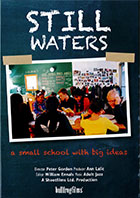
Still Waters: A Small School with Big Ideas 2017
Distributed by Bullfrog Films, PO Box 149, Oley, PA 19547; 800-543-FROG (3764)
Produced by Shootfilms Ltd.
Directed by Peter Gordon
DVD , color, 79 min.
High School - General Adult
Adolescents, Education, Educational Films, Elementary Education, Immigration, Literacy, Writing, Youth
Date Entered: 08/02/2018
Reviewed by Alan Witt, Business Librarian, SUNY GeneseoStill Waters is a documentary film focusing on the eponymous school created by Stephen Haff, built around the philosophy that “Everyone Listens to Everyone.” This phrase acts as a leitmotif and touchstone throughout the film, and is exemplified by the film’s structure, which includes several live classroom sections featuring instruction, classroom management, and students reading their own work aloud.
The film itself follows a year in the life of the school, which is a non-profit enterprise in New York City providing after-school instruction to the children of the local immigrant community. The documentary chronicles both classroom instruction sessions (including creative writing, Latin, and a variety of other activities) and interviews with families of individual students and with the teaching staff. These sections can be, at times, uncomfortably intimate: The filmmakers recorded an interview where a young girl cries about being bullied in school for her last name, as well as an extensive discussion by Haff (during a class session) of his struggles with manic depression. The narrative flows between classroom scenes and home scenes, transitioning with shots of city life, Latin music, and staff members opening or closing the metal shutters of the building’s front door. The film’s ethos is very strongly show-not-tell; most background facts are communicated with brief captions, with the meat of the piece conveyed via live instruction and interviews.
The message of the film is multifaceted, comprised partly of critiques of the mainstream educational system, advocacy of Haff’s philosophy of education, critiques of Trumpian attitudes toward the undocumented immigrant population, and an implied plea for monetary support. Many of the home interview sections also include anxieties generated by gentrification (illuminated by one student saying, “Hipsters are taking away our homes”). While this approach is very strong in communicating authenticity and lived experience, it does make the film feel aimless at times, drifting from topic to topic without a navigator.
Perhaps the clearest thread in the film is Stephen Haff, for whom the documentary acts as a megaphone and platform for his ideas. In interviews and in the classroom he talks about the failures he has witnessed in mainstream education, and the death of creativity he sees as being exacerbated by over-assessment, toxic environments full of bullying, and over-policing in a school setting. He also details his own personal struggle to keep the enterprise (and his family) afloat, a section that feels like a cry for help or a fundraising drive. The instructional segments are an excellent demonstration of his techniques in action, and that thread is almost enough to tie the documentary together.
Unfortunately, from the collection development perspective Still Waters is in the doldrums. It has a very hefty price point, and the flowing nature and lack of clear sectioning in the film renders it somewhat difficult to use in a classroom. There is certainly potential for discussions around race relations, immigration, gentrification, or educational philosophy, but because the film touches briefly on all subjects it falls short in terms of sustained benefit. For fans of Haff’s pedagogical approach, Still Waters could be an excellent addition to their collection, but is otherwise lacking as an educational tool. Despite being inspirational, this film does not deliver a return on investment based on the high price and thus is not recommended for purchase.